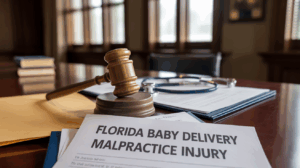
When considering legal action against your doctor for your baby’s shoulder dystocia in Florida, it’s important to understand the state’s medical malpractice laws. As a parent, discovering that your child’s birth injury could have been prevented is a difficult and emotional experience.
At Anidjar & Levine, our experienced attorneys can guide you through the process. To determine if you have a valid claim, we must examine the factors surrounding your case. Consulting with a Fort Lauderdale birth injury lawyer can help you understand your rights and options. Read on to learn more about suing for shoulder dystocia in Florida if your doctor was at fault.
Understanding Shoulder Dystocia and its Consequences
Shoulder dystocia occurs when a baby’s shoulder becomes stuck in the mother’s pelvis during delivery, a life-threatening emergency that requires prompt medical attention. As a result, you may face serious birth complications, including oxygen deprivation, nerve damage, and even brain injury.
In some cases, the baby may experience long-term effects, such as Erb’s palsy or cerebral palsy. Medical guidelines emphasize the importance of prompt recognition and intervention to prevent these severe outcomes. Healthcare providers must be prepared to respond quickly and effectively to minimize harm.
If you’ve experienced shoulder dystocia during delivery, it’s important to understand the consequences and the measures that should have been taken to prevent or mitigate them. Our team can help you sue for shoulder dystocia in Florida if your doctor was at fault.
What Types of Negligence Can Cause Shoulder Dystocia?
Shoulder dystocia is a birth emergency that can lead to serious harm when not properly managed. While some cases occur naturally and unpredictably, others result from medical negligence before or during delivery.
Obstetricians and delivery teams are trained to recognize risk factors and respond quickly. When they fail to take the proper precautions, their inaction or poor decisions can lead to preventable injuries. Types of negligence that may cause shoulder dystocia include:
- Failure to identify risk factors: If a provider ignores or overlooks known risks such as maternal obesity, diabetes, or a history of large babies, they may miss the opportunity to recommend a safer delivery plan, such as a C-section.
- Improper use of delivery tools: Misusing forceps or a vacuum extractor can worsen shoulder dystocia or cause nerve damage to the baby.
- Excessive force during delivery: Applying too much force to the baby’s head or neck when the shoulder is stuck can cause brachial plexus injuries or even fractures.
Proving Causation When Suing for Shoulder Dystocia in Florida if Your Doctor was at Fault
As you build your case against your healthcare provider, it’s important to understand that proving causation is a significant element in a medical malpractice claim.
You must demonstrate a direct causal relationship between the healthcare provider’s actions and the resulting injury or harm. This can be a complicated task, as you’ll need to show that the provider’s negligence was the direct cause of your shoulder dystocia. To establish causation, you’ll need to meet the burden of proof, which requires showing that:
- The healthcare provider breached their duty of care
- This breach caused your injury
- You suffered damages as a result of the injury
- The healthcare provider’s actions (or inactions) were the direct cause of your injury
- The injury was a foreseeable consequence of the provider’s actions
Florida’s Statute of Limitations for Medical Malpractice Cases
Two years is the typical timeframe in which you must file a medical malpractice lawsuit in Florida. This statute of limitations is important to keep in mind, as it can greatly impact your ability to pursue legal action against a healthcare provider.
If you fail to file your lawsuit within this timeframe, you may be barred from seeking compensation for your injuries. It’s important to consult with legal representation as soon as possible to ensure you meet Florida deadlines and requirements.
Damages Available in a Florida Shoulder Dystocia Lawsuit
When pursuing a shoulder dystocia lawsuit in Florida, you may be eligible to recover damages for your losses. Common damages you can recover include:
Medical Expenses
Your medical expenses from a shoulder dystocia injury can be staggering, and obtaining fair compensation is important for your recovery. In a shoulder dystocia lawsuit, you may be eligible for medical expenses coverage, which can help alleviate the financial burden of your injury. This coverage can include:
- Hospital bills and emergency room costs
- Surgical procedures and follow-up care
- Medication and equipment expenses
- Physical therapy and rehabilitation costs
- Ongoing medical care and treatment expenses
Emotional Distress Damages
Trauma has a profound impact on daily life, and a shoulder dystocia injury is no exception. You and your child may experience emotional trauma, which can manifest as anxiety, depression, or post-traumatic stress disorder (PTSD). The psychological impact of this injury can affect your relationships, work, and overall well-being.
In a shoulder dystocia lawsuit, you can seek compensation for emotional distress damages. These damages acknowledge the significant emotional toll of the injury and provide financial support to help you cope with the aftermath. Our team can help you sue for shoulder dystocia in Florida if your doctor was at fault.
Building a Strong Case with Expert Testimony
Since medical malpractice cases involving shoulder dystocia are often complicated and contested, expert testimony plays an important role in building a strong case.
You’ll need to gather expert witnesses with impeccable qualifications to provide objective, unbiased opinions on the standard of care, causation, and damages. Their testimony can make or break your case, so it’s important to choose the right experts. Some key factors to evaluate when building your case with expert testimony include:
- Establishing expert witness qualifications, such as board certification, relevant experience, and a strong publication record
- Reviewing case study examples to demonstrate the applicable standard of care
- Analyzing medical records and documentation to identify potential breaches in care
- Conducting thorough depositions to uncover significant details and inconsistencies
- Developing a clear, concise narrative that effectively communicates medical concepts to a jury
Learn More About Suing for Shoulder Dystocia in Florida if Your Doctor was at Fault
You’ve suffered the devastating consequences of shoulder dystocia due to your doctor’s negligence. By understanding the challenges of medical malpractice law in Florida, Anidjar & Levine can help you build a strong case.
Contact us today for a free consultation.










